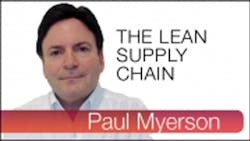Mass Customization…A Lean and Agile Supply Chain Required
When we think of becoming Lean, in many ways, the ultimate process strategy to accomplish this is what is known as “Mass Customization.” This refers to production in batch sizes of one to meet customer specific demand. Mass customization combines the low unit costs of mass production processes with the flexibility of individual customization.
Not too many manufacturers have reached this point yet, although some are headed in that direction (see “Mass customization - Combining elements of mass production with those of bespoke tailoring”).
Examples of the successful execution of mass customization include:
Levi Strauss, an early innovator using the concept in 1994 with its “Original Spin” jeans for women, which leveraged technology to measure customers in its stores and send their details electronically to its factory.
Dell Computers, whose customers design their personal computers online. After that, Dell assembles, tests and ships them as requested at the last minute before delivery (a good example of the use of the concept of “postponement”).
Ford Motor Company allows customers to build a vehicle from a palette of options online and BMW claims that no two of its new cars are identical.
As the concept of mass customization effectively postpones the task of differentiating a product for a specific customer until the latest possible point in the supply network, it can put a lot of stress on one’s supply chain. Thus the need for both your manufacturing and supply chain processes to be Lean and agile.
I write a lot on this blog and elsewhere about Lean supply chain, where there is an ongoing focus on the identification and elimination of waste from the customer’s view. To be successful, this requires efficiency as well as integration and collaboration with customers and suppliers.
However, in order to successfully execute a mass customization strategy, the supply chain needs to also be very agile; meaning that it must be designed to be flexible and fast when dealing with “unique” products with unpredictable demand.
So, not surprisingly, that’s where the idea of having a “hybrid” strategy comes into play. A hybrid supply chain strategy is a combination of lean and agile concepts, where a manufacturer operates with flexible production capacity that can meet surges in demand along with a postponement strategy, where products are partially assembled to a forecast and then completed to the actual order when and even where it arrives.
In the end, your supply chain strategy (and capabilities) must support your organization's overall strategy and typically, in today’s world, that means being lean and agile.
About the Author
Paul Myerson Blog
Professor of Practice in Supply Chain Management
Paul's blog "Lean Supply Chain," has moved. You'll find his latest ideas and commentary on IndustryWeek's IdeaXchange.
You'll find more articles written by Paul at http://www.industryweek.com/blog/lean-supply-chain.
Paul Myerson is Professor of Practice in Supply Chain Management at Lehigh University. He is the author of a Lean Supply Chain & Logistics Management (McGraw-Hill, 2012), developer of a Windows-based supply chain planning software (www.psiplanner.com), and co-author of a lean supply chain and logistics management simulation training game by ENNA (www.enna.com).
